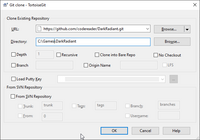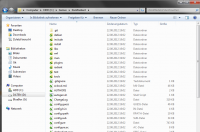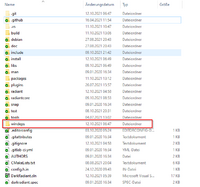DarkRadiant - Compiling in Windows: Difference between revisions
| Line 29: | Line 29: | ||
For Windows builds additional dependencies must be downloaded and copied into the source tree. To keep the github source repository small, the dependencies can be downloaded as 7-zipped packages (you can [http://www.7-zip.org get 7-zip here]): | For Windows builds additional dependencies must be downloaded and copied into the source tree. To keep the github source repository small, the dependencies can be downloaded as 7-zipped packages (you can [http://www.7-zip.org get 7-zip here]): | ||
https://github.com/codereader/DarkRadiant/releases/download/2. | https://github.com/codereader/DarkRadiant/releases/download/2.5.0/windeps.7z | ||
Download and extract it directly to the directory you cloned the sources to. The resulting folder structure should look like this. | Download and extract it directly to the directory you cloned the sources to. The resulting folder structure should look like this. | ||
Revision as of 05:18, 24 December 2017
To compile the sources in Windows you will need Visual Studio 2017 Community Edition or higher. The Community Edition can be acquired for free and is able to produce both 32 Bit and 64 Bit builds.
You will need a Git client to clone the sources to your machine and install the Windows dependencies package. Then you're set up to compile DarkRadiant in Visual Studio.
Install a Git Client
The main codebase is stored and maintained on github, therefore you'll need a Git client like
Download and install the git client into any folder of your preference. After installation it might ask to reboot your machine, as Tortoise integrates into the Explorer shell.
Download Sources and Dependencies
Using Github Desktop
Create your github-login, configure github desktop as desired, especially the default clone path in the options dialog. Browse to the github page of DarkRadiant and click on Clone in Windows. That's it!
Using TortoiseGit
To prepare the source download, open Windows Explorer and create the folder you want to clone (i.e. download) the sources into. Make sure the folder does not contain spaces. Use your Git client to clone the DarkRadiant repository from github:
Cloning takes a minute or two - after the process is finished your folder should be looking like this:
This is not yet enough to compile DarkRadiant in Windows, you still need to download and extract the dependencies, see the next step.
Download the Dependencies Package
For Windows builds additional dependencies must be downloaded and copied into the source tree. To keep the github source repository small, the dependencies can be downloaded as 7-zipped packages (you can get 7-zip here):
https://github.com/codereader/DarkRadiant/releases/download/2.5.0/windeps.7z
Download and extract it directly to the directory you cloned the sources to. The resulting folder structure should look like this.
Important: The w32deps/ and w64deps/ folder must be in the same folder as the radiant/ or include/ folder.
Compile
Start Visual Studio and open the DarkRadiant solution file (.sln) which is ready for you in the tools/msvc folder.
To build a package for the x64 target, make sure to select the x64 platform from the configuration manager's dropdown box (located in Visual Studio's toolbar). If you prefer a 32 bit build, select the Win32 target.
Select release build (unless you want to debug a problem) and hit Ctrl-Shift-B in VC++ to start building the sources or select "Build > Build Solution" from the menus.
Note
If you cloned the sources to C:\Games\DarkRadiant, the application binary will be placed in C:\Games\DarkRadiant\install\DarkRadiant.exeThe project output files are set up in a way to automatically install the binaries in the install/, install/modules/ and install/plugins/ folders. Also, all dependencies from the w32deps/ folder (see previous section) are automatically copied to the install/ folder during the post-build event. If anything goes wrong during compilation, please seek help in the forums.
The build expects the w32deps folder to be located alongside the sources, especially x64 builds expect the w64deps folder to be sitting next to it. See above for how to set up the folders in case you missed that step. For both platforms the output will be placed in the same install/ directory.
(Optional) Compiling the Windows Dependencies
This step is optional and more advanced. You won't need to do this if you just want to compile and run DarkRadiant using the currently maintained version of Visual Studio.
Note: in the past DarkRadiant was linking against a few boost libraries requiring static libraries, this is no longer the case as of August 2017.
Compile the support libraries
DarkRadiant is using a lot of third-party libraries like libxml2, libiconv, vorbis, etc.
For Windows I set up custom VC++ solutions to compile most of the libraries directly from the source (as many of those third-party projects don't offer Windows x64 binaries), these projects can be found in the winbuild folder in Git. The winbuild folder contains all the sources needed to build the Win32/Win64 dependency binaries. Note that the headers are stored in w32deps, as the main DarkRadiant project needs them there, so w32deps is the place to look for most of the shared headers.
The VC++ project files can be found in the winbuild/msvc folder. To check out the repo, go ahead like this:
- Right-click your C:\Games folder >> Git Clone...
- Select https://github.com/codereader/DarkRadiant_WinDeps.git to C:\Games\DarkRadiant_WinDeps
or by using the git command line
- git clone https://github.com/codereader/DarkRadiant_WinDeps.git C:\Games\DarkRadiant_WinDeps
Program Database Files (.pdb)
When debugging a DarkRadiant crashdump, you'll need the program database files to get substantial information out of it, so it's vital to save the .pdb files right after compilation, otherwise they won't match against the signatures in the crashdump.
As far as the windeps dependencies are concerned, I've zipped up all the .pdb files and stored them on the GitHub release page:


